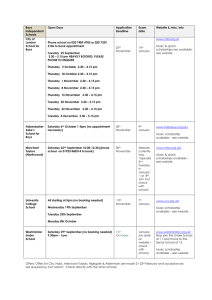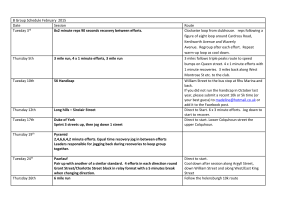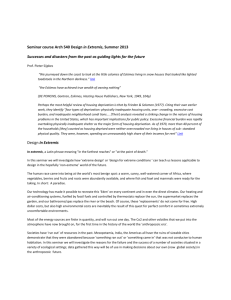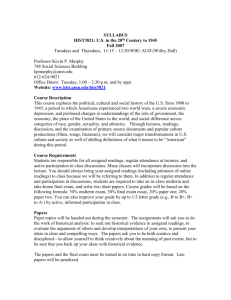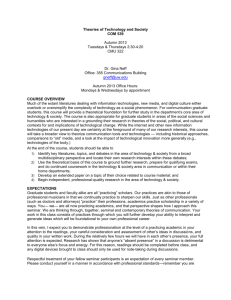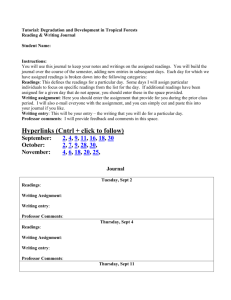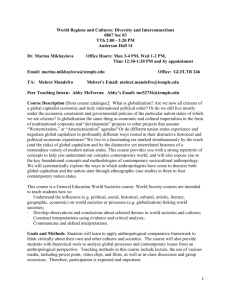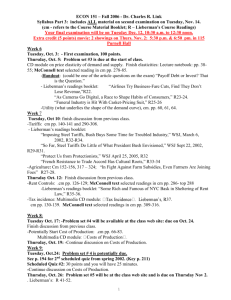DRAFT PA 5042: Urban and Regional Economics (Spring, 2 credits)
advertisement
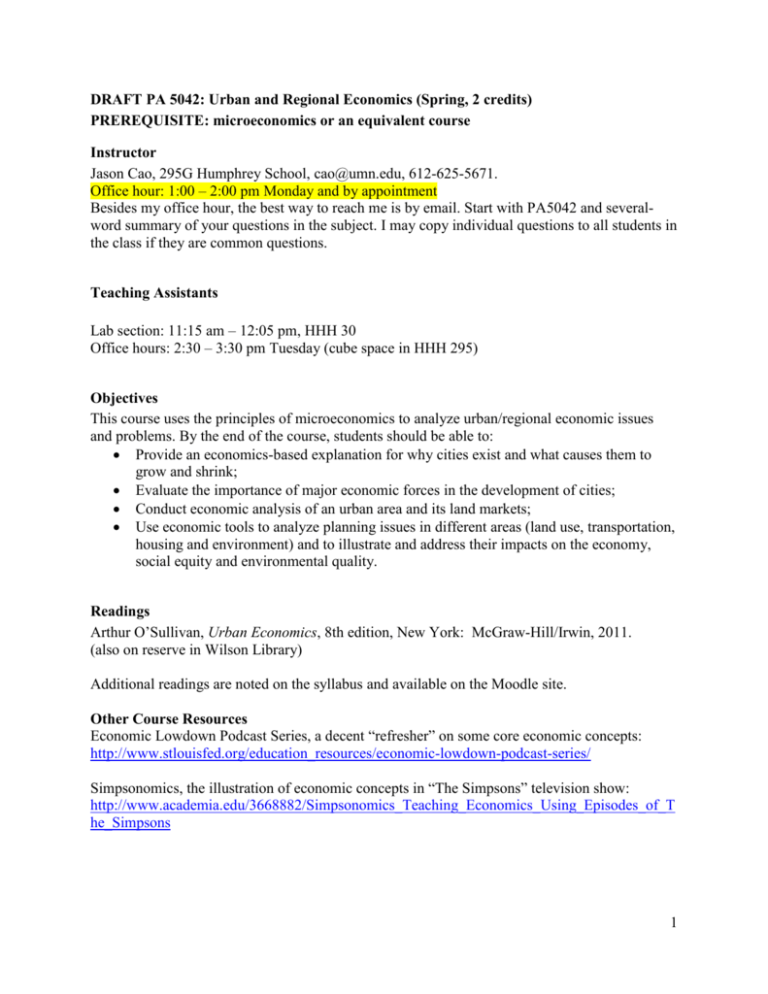
DRAFT PA 5042: Urban and Regional Economics (Spring, 2 credits) PREREQUISITE: microeconomics or an equivalent course Instructor Jason Cao, 295G Humphrey School, cao@umn.edu, 612-625-5671. Office hour: 1:00 – 2:00 pm Monday and by appointment Besides my office hour, the best way to reach me is by email. Start with PA5042 and severalword summary of your questions in the subject. I may copy individual questions to all students in the class if they are common questions. Teaching Assistants Lab section: 11:15 am – 12:05 pm, HHH 30 Office hours: 2:30 – 3:30 pm Tuesday (cube space in HHH 295) Objectives This course uses the principles of microeconomics to analyze urban/regional economic issues and problems. By the end of the course, students should be able to: Provide an economics-based explanation for why cities exist and what causes them to grow and shrink; Evaluate the importance of major economic forces in the development of cities; Conduct economic analysis of an urban area and its land markets; Use economic tools to analyze planning issues in different areas (land use, transportation, housing and environment) and to illustrate and address their impacts on the economy, social equity and environmental quality. Readings Arthur O’Sullivan, Urban Economics, 8th edition, New York: McGraw-Hill/Irwin, 2011. (also on reserve in Wilson Library) Additional readings are noted on the syllabus and available on the Moodle site. Other Course Resources Economic Lowdown Podcast Series, a decent “refresher” on some core economic concepts: http://www.stlouisfed.org/education_resources/economic-lowdown-podcast-series/ Simpsonomics, the illustration of economic concepts in “The Simpsons” television show: http://www.academia.edu/3668882/Simpsonomics_Teaching_Economics_Using_Episodes_of_T he_Simpsons 1 Course Requirements and Grading The lectures will cover only the key concepts presented in the readings. Completing the readings before lectures is essential to maximize your learning. Attendance at lab sessions is mandatory. You will find it helpful, I promise. Feel free to discuss homework problems with your peers. However, you are expected to finish your assignments individually. This class is demanding. It covers a lot of material at a pace that students describe as “relentless” or (more positively) “high energy.” It requires considerable outside-of-class time. UM policy states that for each credit hour of a class, undergraduates are expected to work three hours – counting class time and study time – to achieve an average grade. If we apply that policy to this graduate-level class, that means a work load of 12 hours per week for this class, implying at least 8 hours per week outside of class. Count on it. (see http://policy.umn.edu/education/studentwork) Grades will be based on the following: Homework assignments 7 x 10% Final exam 30% The homework is a deliberately sizable portion of your grade, as (1) it is in your best interests to do it and keep up, and (2) it helps take some of the stress off the exam, and can help bring up your final grade if you have difficulty with the time pressure of exams. All homework assignments, in hard copies, are due in class on the following Thursdays. The penalty for each day of delay (1 minute to 24 hours) is worth 20% of the assignment grade. If you wish to dispute the grade of an assignment, you must do so IN WRITING within one week after the assignment has been returned. You must include a specific rationale for why your assignment deserves a higher grade. If you have any concern regarding the scheduling of the exam, come to me before the exam. No excuse will be accepted after the exam. A doctor’s note is required for make-up of the exam. Course Policies Academic dishonesty: Students are expected to do their own assigned work. If it is determined that a student has engaged in any form of Academic Dishonesty, he or she may be given an "F" or an "N" for the course, and may face additional sanctions from the University. Academic dishonesty in any portion of the academic work for a course shall be grounds for awarding a grade of F or N for the entire course. See http://regents.umn.edu/sites/regents.umn.edu/files/policies/Student_Conduct_Code.pdf Diversity and collegiality: This course draws graduate students from a variety of disciplines. This diversity of academic experience, assumptions regarding learning, and ways of approaching problems is one of the most enriching aspects of the course. In addition, every class is influenced by the fact that students come from widely diverse ethnic and cultural backgrounds and hold different values. Because a key to optimal learning and successful teaching is to hear, analyze, and draw from a diversity of views, the instructors expect collegial and respectful dialogue across disciplinary, cultural, and personal boundaries. 2 Student conduct: Instructors are responsible for maintaining order and a positive learning environment in the classroom. Students whose behavior is disruptive either to the instructor or to other students will be asked to leave. Students whose behavior suggests the need for counseling or other assistance may be referred to their college office or University Counseling and Consulting Services. Students whose behavior may violate the University Student Conduct Code may be referred to the Office of Student Judicial Affairs. Sexual harassment: University policy prohibits sexual harassment as defined in the University Policy Statement (https://policy.umn.edu/hr/sexualharassment) revised on January 2014. Accommodations for students with disabilities: Participants with special needs are strongly encouraged to talk to the instructors by the second Thursday to gain maximum access to course information. All discussions will remain confidential. University policy is to provide, on a flexible and individualized basis, reasonable accommodations to students who have documented disability conditions (e.g., physical, learning, psychiatric, vision, hearing, or systemic) that may affect their ability to participate in course activities or to meet course requirements. Students with disabilities are encouraged to contact Disability Services and their instructors to discuss their individual needs for accommodations. Student mental health: As a student you may experience a range of issues that can cause barriers to learning, such as strained relationships, increased anxiety, alcohol/drug problems, feeling down, difficulty concentrating and/or lack of motivation. These mental health concerns or stressful events may lead to diminished academic performance or reduce a student's ability to participate in daily activities. University of Minnesota services are available to assist you with addressing these and other concerns you may be experiencing. You can learn more about the broad range of confidential mental health services available on campus via http://www.mentalhealth.umn.edu/ Schedule Week 1: Introduction Tue (1/20) & Thur (1/22) Ch1: Introduction and axioms of urban economics Appendix: Tools of microeconomics (pp. 455-477) Parchomovsky, Gideon and Peter Siegelman. 2012. “Cities, Property, and Positive Externalities.” William and Mary Law Review 54(1): 211-261. Week 2: City Development Tuesday (1/27): Ch2: Why do cities exist? Thursday (1/29): Ch3: Why do firms cluster? Puga, Diego. 2010. “The Magnitude and Causes of Agglomeration Economies.” Journal of Regional Science 50(1): 203-219. (Recommended) Ch4: City size, pp. 70-75 3 Week 3: City Development and Land Rent Tuesday (2/3): Ch5: Urban growth Thursday (2/5): Ch6: Urban land rent Week 4: Land Use Tuesday (2/10): Thursday (2/12): Ch8: Neighborhood choice Ch9: Zoning and growth controls Rothwell, Jonathan and Douglas S. Massey. 2009. “The Effect of Density Zoning on Racial Segregation in U.S. Urban Areas.” Urban Affairs Review 44(6): 779-806. (Recommended) Week 5: Transportation Tuesday (2/17): Ch10: Autos and highways Wang, Tingting and Cynthia Chen. 2014. “Impact of Fuel Price on Vehicle Miles Traveled (VMT): Do the Poor Respond in the Same Way as the Rich?” Transportation 41:91-105. Thursday (2/19): Ch11: Urban transit Higgins, Christopher, Mark R. Ferguson, and Pavlos S. Kanaroglou. 2014. “Light Rail and Land Use Change: Rail Transit’s Role in Reshaping and Revitalizing Cities.” Journal of Public Transportation 17(2): 93-112. Week 6: Housing Tuesday (2/24): Thursday (2/26): Ch14: Why is housing different? (guest lecturer) Ch15: Housing policy Ventry, Dennis J. 2014. “Misinformed and Misled About the Benefits of the Mortgage Interest Deduction.” Cityscape 16(1): 219-232. (Recommended) Weicher, John C. 2014. “The Efficiency and Equity of the Home Mortgage Interest Deduction.” Cityscape 16(1): 207-210. (Recommended) Week 7: Local Government Tuesday (3/3): Ch17: Local Government Revenue Thursday (3/5): Final exam 4



